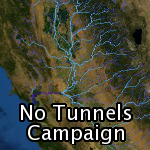Article from Indybay.
https://www.indybay.org/newsitems/2014/06/16/18757488.php
by Dan Bacher
Monday Jun 16th, 2014 5:19 PM
Remember Jerry Meral, the guy who claimed the “Delta cannot be saved” while he was working for the Brown administration on the Bay Delta Conservation Plan (BDCP) to build the peripheral tunnels? (http://www.dailykos.com/story/2013/04/26/1205064/-Five-Congressional-Democrats-call-for-Brown-administration-official-s-resignation)
Well, it appears that Meral has run afoul of the state’s laws governing lobbying activities at a time when corruption and conflicts of interest are mushrooming in California politics.
Restore the Delta (RTD), opponents of Governor Jerry Brown’s rush to build the Peripheral Tunnels to drain the California Delta, on June 13 filed a complaint with the Fair Political Practices Commission (FPPC) charging former Brown Administration Bay Delta Conservation Plan (BDCP) point man, Jerry Meral, with “illegal lobbying.”
“Meral appears to be violating the law prohibiting former administration officials from lobbying within one year and one day of leaving office,” according to a statement from Restore the Delta. “Since January 2014, Meral has authored several versions of a Natural Heritage Institute-promoted (NHI) water bond for legislative consideration in 2014, and made direct contacts with staff in numerous legislators’ offices to influence legislation.”
Barbara Barrigan-Parrilla, executive director of RTD, said, “Our complaint charges Jerry Meral with illegal lobbying during the period when former administration officials are barred from doing so. The revolving door between the Brown Administration, water exporters and groups that would benefit from the tunnels project and its habitat programs just keeps turning.”
Meral’s attempt to lobby and otherwise influence the state legislature and the agency, and the activities that he managed the day before leaving state employment, is illegal under the following statutes and regulations, according to Barrigan-Parrilla:
- Lobbying within one year of leaving a position in state service violates §87406, Regulations 18746.1 and 18746.2 of the Political Reform Act.
- Leaving state employment and being hired by NHI the following day begs the question of Influencing Prospective Employment (See Section 87407; Regulation 18747). “The legal issue of if he had prior contact with this prospective employer regarding an interview or discussion of an offer of employment seems self-evident and otherwise inexplicable given the timing,” she stated.
Barrigan-Parrilla said Meral has been observed visiting the Legislature to “promote” his versions of the bond and the BDCP. Meral’s bond includes specific funding for BDCP-related San Joaquin Delta conservation projects. Meral wants funding removed and restricted from levee projects, which constitutes lobbying to change the outcome of existing proposed legislation for the benefit of BDCP.
“It appears that Meral did not renew his lobbying certification, complete his ethics training, and has failed to timely file disclosures. Given that Meral is aware of these procedures from his previous two-year stint as a lobbyist, immediate corrective action and the maximum penalty should occur,” said Barrigan-Parrilla.
The potential financial incentive for NHI’s ability to successfully lobby or influence Resources, DWR and the Legislature is massive. Billions of dollars are at stake with the BDCP for NHI and other non-profit organizations as defined in the NHI proposed water bond, she noted.
NHI proposed Sections 79740 and 79742 provide for direct and indirect funding for potential NHI-affiliated habitat projects of no more than $1.2 billion, directly to non-profits through grants and through pass through monies managed and distributed by Resources/DWR, and the Delta Conservancy; and, even more funding from DWR’s California Water Commission, according to the group.
In his February 23, 2014 letter from NHI, Meral specifically directs that the Delta Protection Commission “follow the provisions described in this letter” regarding wildlife habitat and levee funding from a proposed new special district, which have historically received significant funding from DWR under the subventions program.
Barrigan-Parrilla said Meral appears to be demanding a de facto “cut of the action” from the new district for his BDCP habitat projects. Meral also lobbies for the state water contractors (SWC) to be paid back from supposed overpayments under the Davis-Dohlwig Act, also in an effort to promote the ability of the SWC to pay for BDCP.
Jerry Meral served as Deputy Secretary of Natural Resources for the State of California from 2011 to December 31, 2013. He acted as Director of the Bay Delta Conservation Plan (BDCP) to build the twin tunnels during this time.
On January 1, 2014, Meral accepted a position as Director of the California Water Program for the Natural Heritage Institute (NHI).
“The NHI currently has direct ties to the BDCP, direct and indirect financial benefit from its completion, and continues to lobby for its funding and implementation, as evidenced by the documentation that can be found at http://restorethedelta.org/?p=5599,” according to RTD.
Upon his acceptance of the position, NHI issued a statement on their website announcing that Meral was representing NHI on California water issues, specifically including the BDCP. In this statement, the NGO touted itself as “an early and strenuous proponent of the Bay Delta Conservation Plan” (http://yubanet.com/california/Natural-Heritage-Institute-Hires-Jerry-Meral.php#.U6G2i93DyRo)
“NHI finds the evidence overwhelming that the delta cannot serve the dual functions of maintaining endangered species and water supply reliability without a massive habitat restoration program and improvements to the water diversion and conveyance infrastructure that can reduce the conflicts between these uses,” the NHI stated.
Not only has the NHI has been an “early and strenuous” cheerleader of the BDCP, but the organization has long championed water markets and water transfers that have privatized water and transformed a public trust asset, belonging to all citizens, into a “profit center to enrich special interests,” according to Bill Jennings, Executive Director of the California Sportfishing Protection Alliance (CSPA).
“NHI also developed the concept that became the Environmental Water Account, which enabled water speculators to sell public trust water back to the public at vast profit,” said Jennings
This is not the first time that Mr. Meral has engaged in questionable practices. In 2002, Meral authored Proposition 51, an initiative that the Sacramento Bee called “California’s most corrupt initiative.” The Bee also called Meral’s group “a morally bankrupt environmental lobby.” (Editorial: No on Proposition 51: stop California’s most corrupt initiative, September 29, 2002). (http://digital.library.ucla.edu/websites/2002_998_063/beeed.htm)
The Bee editors wrote, “But financial irresponsibility is the least of this measure’s sins. It is fundamentally corrupt. It’s an unapologetic example of ‘pay to play.’ To get this measure on the ballot and pass it, Gerald Meral, executive director of PCL, studded it with projects for developers and groups willing to contribute to the campaign.”
“For example, Tejon Ranch Co. would get $5 million in improvements on an Interstate 5 interchange to support its distribution center in Kern County; it contributed $65,000. Hillwood Development Corp. would get $30 million worth of railroad grade crossings near its proposed distribution center at former Norton Air Force Base in San Bernadino; it has given $150,000. The list of projects tied to contributions goes on and on. We’ll be detailing some of the scummiest deals here in coming days,” they added.
For more information, go to http://www.restorethedelta.org.
The FPPC complaint against Jerry Meral takes place in context of the larger picture of the corruption of California environmental politics in recent years.
The revolving door between corporate interests, water contractors and state government swung wide-open last September when Governor Jerry Brown appointed Laura King Moon of Woodland, a lobbyist for the state’s water exporters, as chief deputy director of the California Department of Water Resources (DWR).
Moon was a project manager for the Bay Delta Conservation Plan since 2011 while “on loan” from the State Water Contractors, a non-profit association of 27 public agencies from Northern, Central and Southern California that purchase water under contract from the California State Water Project.
And Moon’s appointment was just one of the many examples of the revolving door between corporations and state government that have infested politics in California during the Schwarzenegger and Brown administrations. These examples include:
- The resignation of State Senator Michael J. Rubio in February 2013 to go work in a “government affairs” position for Chevron. Rubio, who was leading the charge to weaken the landmark California Environmental Quality Act (CEQA) and make it more friendly to corporations, claimed he resigned in order to spend more time with his family. (http://www.dailykos.com/story/2013/02/23/1189354/-Senator-Michael-Rubio-resigns-to-take-job-with-Chevron)
- DWR’s hiring of Susan Ramos “on loan” from the Westlands Water District, the “Darth Vader” of California water politics, to serve as “a liaison between all relevant parties” surrounding the Delta Habitat Conservation and Conveyance Program (DHCCP) and provide “technical and strategic assistance” to DWR. (http://www.indybay.org/newsitems/2011/12/14/18702762.php)
Documents obtained by this reporter under the California Public Records Act revealed that Ramos, Deputy General Manager of the Westlands Water District, was hired in an “inter-jurisdictional personal exchange agreement” between the Department of Water Resources and Westlands Water District from November 15, 2009 through December 31, 2010. The contract was extended to run through December 31, 2011 and again to continue through December 31, 2012.
- The hijacking of “marine protection” in California by Catherine Reheis-Boyd, President of the Western States Petroleum Association (WSPA). Reheis-Boyd chaired the Marine Life Protection Act (MLPA) Initiative Blue Ribbon Task Force to create alleged “marine protected areas” in Southern California and served on the task forces for the Central Coast, North Central Coast and North Coast. (http://yubanet.com/california/Dan-Bacher-Top-Censored-Environmental-Story-of-2012-Marine-guardian-lobbies-for-offshore-oil-drilling-fracking.php)
- The failure of Katherine Hart Johns, Central Valley Regional Water Quality Control Board member, to report her husband’s separate property interest in his lobbying firm, California Resource Strategies, Inc., on her 2006, 2007, and 2008 annual Statements of Economic Interests. The California Fair Political Practices Commission fined Hart Johns only $600 for this overt conflict of interest, in a classic example of how violators of state ethics and environmental laws often get off with a mere “slap on the wrist.” (http://www.sacbee.com/2010/03/21/2622315/water-pollution-regulator-failed.html).
And of course, we can’t forget the three Senators – Leland Yee of San Francisco, Ron Calderon of Montebello and Rod Wright of Inglewood – who were suspended from the State Senate with pay this March. Senators Yee and Calderon were indicted in separate federal corruption cases, while Senator Wright will be sentenced on July 21 on criminal charges that he lied about where he lived when he ran for office in 2008. (http://blogs.sacbee.com/capitolalertlatest/rod-wright/#storylink=cpy)
Nor can we overlook one of the greatest scandals to hit environmental politics in recent years – the 10 month federal prison sentence that a federal judge in May imposed upon Ron LeValley of Mad River Biologists, the former co-chair of the Marine Life Protection Act (MLPA) Initiative Science Advisory Team for the North Coast, for his role in a conspiracy to embezzle over $852,000 in federal funds from the Yurok Tribe.
In February, LeValley pleaded guilty to a single federal charge of conspiracy to commit embezzlement and theft from an Indian Tribal Organization (18U.S.C §§ 371 and 1163) in the complex scheme in collaboration with former Yurok Forestry Director Roland Raymond. According to court documents, LeValley submitted more than 75 false invoices between 2007 and 2010 in payment for “work” on northern spotted owl surveys that was never performed. The link to the indictment is available at: http://noyonews.net/wp-content/uploads/2013/10/U.S._v._Ron_LeValley_As_Filed.pd
Restore the Delta’s FPPC complaint proceeds forward as the Brown administration fast-tracks the $67 billion Bay Delta Conservation Plan to build twin tunnels to export water to corporate agribusiness interests irrigating drainage-impaired land on the west side of the San Joaquin Valley.
The peripheral tunnels under the Delta will hasten the extinction of Central Valley Chinook salmon and steelhead, Delta smelt, longfin smelt, green sturgeon and fish species, as well as pose an enormous threat to salmon and steelhead populations on the Trinity and Klamath rivers.
Background on Meral and the BDCP
Jerry Meral became the focus of a huge controversy when he acknowledged on April 15, 2013 that “BDCP is not about, and has never been about saving the Delta.The Delta cannot be saved.”
He made his controversial comments while speaking with Tom Stokely of the California Water Impact Network (C-WIN) in a private conversation after a meeting with Northern California Indian Tribes, according to Restore the Delta’s “Delta Flows” newsletter (http://www.restorethedelta.org/or-is-it-the-point/)
After Meral made the revealing, candid comments, five Congressional Democrats – George Miller, Mike Thompson, Jerry McNerney, Doris Matsui and Anna Eshoo – called for Meral’s immediate resignation. (http://www.fishsniffer.com/blogs/details/congressional-democrats-call-for-brown-administration-officials-resignation/)
“Meral’s statement, if accurately reported, suggests the Brown Administration intends to explicitly violate the established statutory co-equal goals of ecosystem restoration in the Bay-Delta and water reliability throughout the state,” according to the Representatives’ statement. “This fuels speculation that the Administration’s plan, if unchanged, will devastate the Sacramento-San Joaquin River Delta and the communities that rely on it, a concern that Northern California Lawmakers and other stakeholders have voiced throughout the process.”
The widely-criticized plan proposes to construct three new intakes in the north Delta along the Sacramento River about 35 miles north of the existing South Delta pumping plants. Two 35-mile long twin tunnels would carry the water underground to the existing pumping plants that feed canals stretching hundreds of miles to the south and west.









